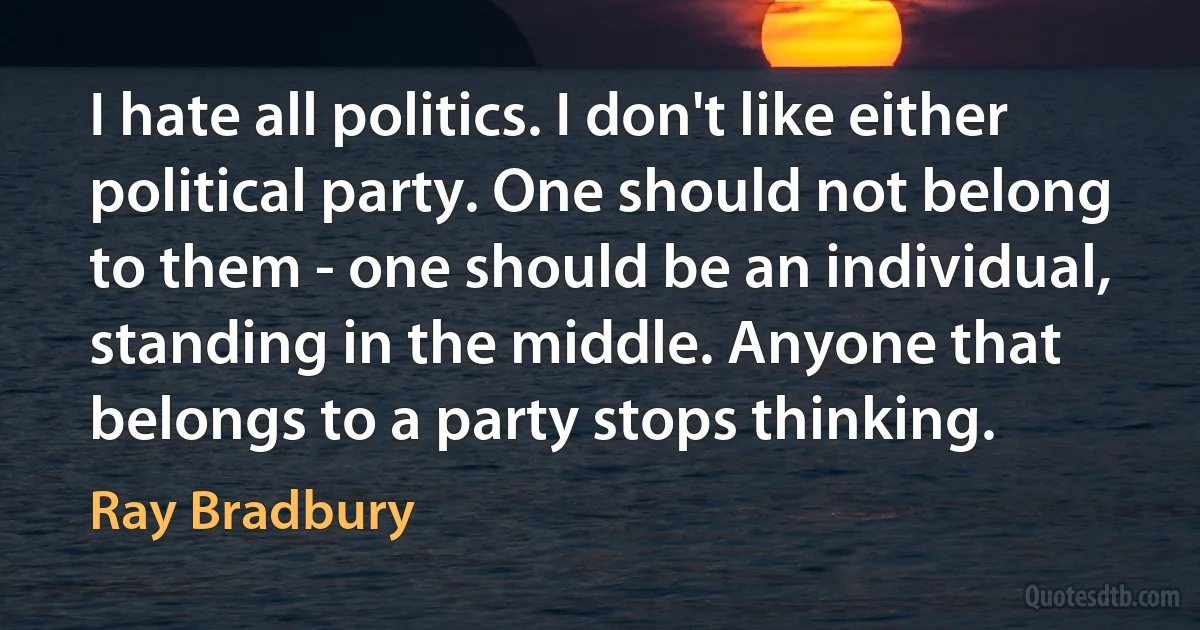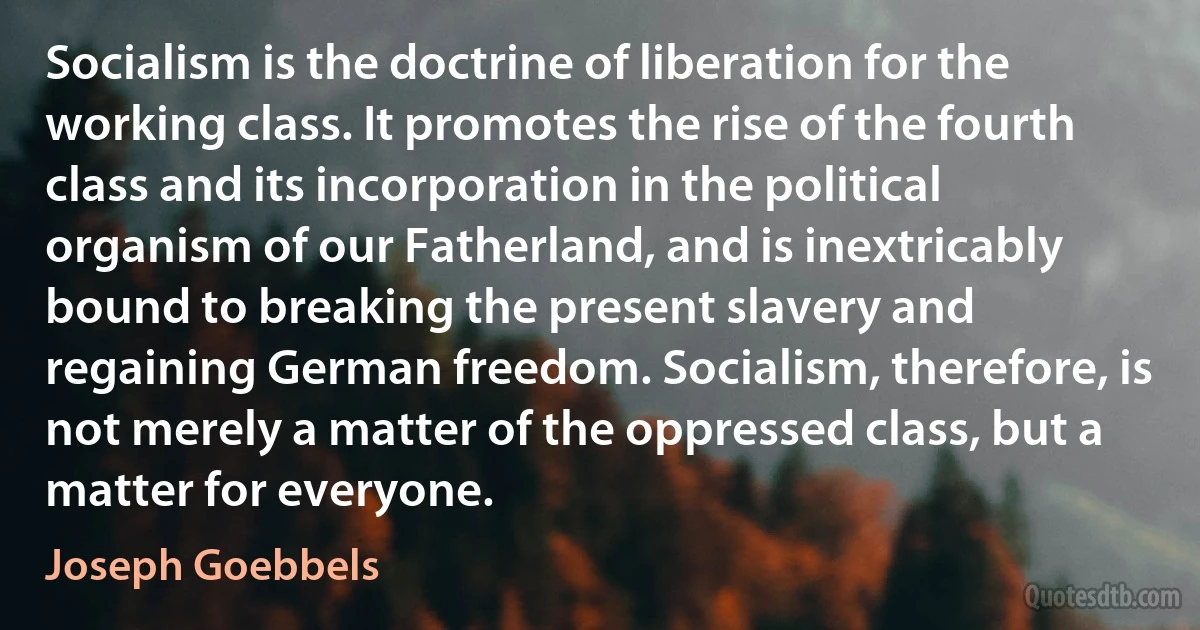Political Quotes - page 94
I'm working on a screenplay of Fahrenheit 451 that will star Mel Gibson. It will be better than the original because they left a lot of things out of the first film. ... It works even better because we have political correctness now. Political correctness is the real enemy these days. The black groups want to control our thinking and you can't say certain things. The homosexual groups don't want you to criticize them. It's thought control and freedom of speech control.

Ray Bradbury
Does political correctness have a good side? Yes, it does, for it makes us re-examine attitudes, and that is always useful. The trouble is that, as with all popular movements, the lunatic fringe so quickly ceases to be a fringe; the tail begins to wag the dog. For every woman or man who is quietly and sensibly using the idea to look carefully at our assumptions, there are twenty rabble-rousers whose real motive is a desire for power over others. The fact that they see themselves as antiracists or feminists or whatever does not make them any less rabble-rousers.

Doris Lessing
I wish to propose a doctrine which may, I fear, appear wildly paradoxical and subversive. The doctrine in question is this: that it is undesirable to believe a proposition when there is no ground whatever for supposing it true. I must, of course, admit that if such an opinion became common it would completely transform our social life and our political system; since both are at present faultless, this must weigh against it.

Carl Sagan
But our openness to the dazzling possibilities presented by modern science must be tempered by some hard-nosed skepticism. Many interesting possibilities simply turn out to be wrong. An openness to new possibilities and a willingness to ask hard questions are both required to advance our knowledge. And the asking of tough questions has an ancillary benefit: political and religious life in America, especially in the last decade and a half, has been marked by an excessive public credulity, an unwillingness to ask difficult questions, which has produced a demonstrable impairment in our national health. Consumer skepticism makes quality products. This may be why governments and churches and school systems do not exhibit unseemly zeal in encouraging critical thought. They know they themselves are vulnerable.

Carl Sagan
Without these experimental tests, very few physicists would have accepted general relativity. There are many hypotheses in physics of almost comparable brilliance and elegance that have been rejected because they did not survive such a confrontation with experiment. In my view, the human condition would be greatly improved if such confrontations and willingness to reject hypotheses were a regular part of our social, political, economic, religious and cultural lives.

Carl Sagan
When we look into a mirror we think the image that confronts us is accurate. But move a millimetre and the image changes. We are actually looking at a never-ending range of reflections. But sometimes a writer has to smash the mirror - for it is on the other side of that mirror that the truth stares at us.
I believe that despite the enormous odds which exist, unflinching, unswerving, fierce intellectual determination, as citizens, to define the real truth of our lives and our societies is a crucial obligation which devolves upon us all. It is in fact mandatory.
If such a determination is not embodied in our political vision we have no hope of restoring what is so nearly lost to us - the dignity of man.

Harold Pinter
I believe that we cannot survive as a democratic country when we are supporting someone like Thieu in Saigon, who has put 300,000 political prisoners in jail because they've spoken in favor of peace. I just don't believe that when a Republican Party bugs the Democratic Party headquarters, that that smacks of democracy. These kind of things I speak out against. That doesn't mean I'm a Communist.

Jane Fonda
A very bold political measure of Lycurgus is his redistribution of the land. For there was a dreadful inequality in this regard, the city was heavily burdened with indigent and helpless people, and wealth was wholly concentrated in the hands of a few. Determined, therefore, to banish insolence and envy and crime and luxury, and those yet more deep-seated and afflictive diseases of the state, poverty and wealth, he persuaded his fellow-citizens to make one parcel of all their territory and divide it up anew, and to live with one another on a basis of entire uniformity and equality in the means of subsistence, seeking preëminence through virtue alone, assured that there was no other difference or inequality between man and man than that which was established by blame for base actions and praise for good ones.

Plutarch
Good sense, common sense and proper process are what should rule this parliament. That is what I believe is the path forward for this parliament, not the kinds of double standards and political game playing imposed by the Leader of the Opposition, who is now looking at his watch because, apparently, a woman has spoken for too long [loud protests from the Opposition benches]-I have had him yell at me to shut up in the past!

Julia Gillard
The bourgeois is about to leave the historical stage. In its place will come the class of productive workers, the working class, that has been up until today oppressed. It is beginning to fulfill its political mission. It is involved in a hard and bitter struggle for political power as it seeks to become part of the national organism. The battle began in the economic realm; it will finish in the political.

Joseph Goebbels
We are socialists because we see the social question as a matter of necessity and justice for the very existence of a state for our people, not a question of cheap pity or insulting sentimentality. The worker has a claim to a living standard that corresponds to what he produces. We have no intention of begging for that right... Since the political powers of the day are neither willing nor able to create such a situation, socialism must be fought for. It is a fighting slogan both inwardly and outwardly. It is aimed domestically at the bourgeois parties and Marxism at the same time, because both are sworn enemies of the coming workers' state. It is directed abroad at all powers that threaten our national existence and thereby the possibility of the coming socialist national state.

Joseph Goebbels
We speak about cooperation but seem hesitant to commit ourselves to a global offensive to root out terrorism, with the pooling of resources, exchange of information, sharing of intelligence, and the unambiguous unity of purpose required. This must change. We do have a global coalition against terrorism. We must give it substance and credibility, avoiding selective approaches and political expediency.

Manmohan Singh
A white man's government? Not a government of intelligence, of justice, of virtue? Not a government by the consent of the governed, but a government of complexion? Where reason is skin deep? Who is a white man? Is a Spaniard? Is a Creole? Is an octoroon? Ohio says that a blood mixture of half-and-half will do for her. But if you have a qualification for the enjoyment of equal rights which vast numbers of our population cannot by nature satisfy, it is as if you made it depend upon a man's height or the color of his hair. You ask us to prefer a system of accidents to one of principles. You ask us to agree that a worthless, idle, drunken rascal, whose face might possibly be white if it could ever be washed clean enough, may be more safely trusted with political power, than an honest, intelligent, sober, industrious colored citizen.

George William Curtis
From the invention of the cotton-gin slavery became a progressive system - not passively tolerated as in process of extinction, but actively striving for development and extension. It became a conscious political power. It made no offensive professions. It still deprecated itself as an evil, so difficult to deal with, and, with an adroit allusion to Ham and Onesimus, it smoothed the ecclesiastical conscience of the country and only asked to be let alone. And it was let alone. The War of 1812, and the consequent commercial confusion and renewed devotion to trade, held the country torpid upon the subject. If anybody looked at slavery inquisitively, it folded its hands demurely upon its breast and said, 'I am such a dreadful thing! How unfortunate that I should exist! What can be done with me? Just please to let me alone, that is all I want. A leper, you see; a miserable leper!

George William Curtis



